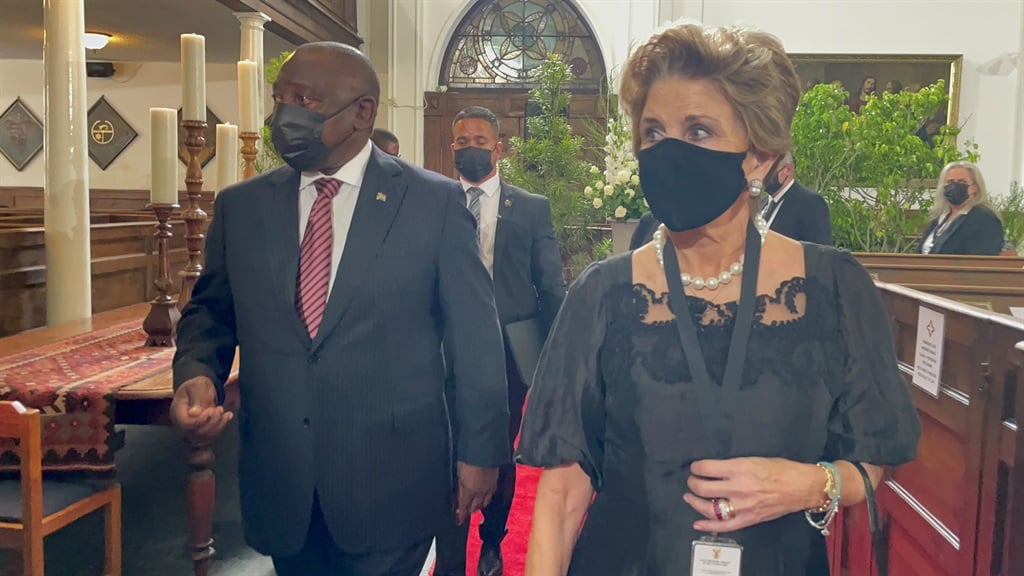Ramaphosa tells FW de Klerk mourners: 'We can never forget lost lives, rights denied, dreams dashed'

WATCH | FW de Klerk state memorial: 'Let us release him to rest' - Ramaphosa
South Africa's last apartheid president, FW de Klerk, was on Sunday lauded for his bravery and his role in the negotiations for the country's Constitution.
- According to Cyril Ramaphosa, those who remember FW de Klerk for the pain of the past should not be dismissed.
- Ramaphosa delivered the eulogy at a state memorial service for De Klerk in Cape Town.
- The president told mourners the pain and destruction of lives should not be forgotten.
President Cyril Ramaphosa says the anger and pain of those who remember FW de Klerk's role in the hierarchy of an oppressive state cannot be ignored, nor should it be dismissed.
On Sunday, Ramaphosa delivered the eulogy at a state memorial service for De Klerk at the historic Groote Kerk in Cape Town.
"We can neither ignore nor must we ever seek to dismiss the anger, the pain and the disappointment of those who recall the place FW de Klerk occupied in the hierarchy of an oppressive state. We must never forget the injustices of the past. We must never forget the atrocities at Boipatong, Bisho, KwaMakhutha, Langa, Soweto and Sharpeville," Ramaphosa said.
He told mourners that, in a democratic South Africa, it remains everyone's responsibility to mend broken relations.
"We can never forget the lives that were lost, the families that were torn apart, the land that was taken, the livelihoods that were destroyed, the rights that were denied, and the dreams that were dashed. We can never forget the humiliation, the degradation and the inhumanity, nor must we ever forget the responsibility that we each bear to consign such suffering and injustice to the past," Ramaphosa said.
"Each of us has a responsibility to help build a new nation and a new society dedicated to the realisation of the potential of all. Change did not come soon enough for the many South Africans who lost their lives at the hands of a cruel regime, but the change did nonetheless come. It came in the form of our Constitution, in whose shade millions of our people shelter today.
"As much as we cannot escape history's scrutiny, as much as the wounds of the past are still fresh in the minds of many, we should strive to give effect to the promise that we made to ourselves on that day in Sharpeville 25 years ago," he said.

WATCH | FW de Klerk apologises 'without qualification' for apartheid in 'last message'
Last apartheid president FW de Klerk apologised "without qualification" for the misery apartheid wrought on black, brown and Indian South Africans. In a pre-recorded message De Klerk said he had a change of heart about apartheid in the early 1980s.
De Klerk died at his home in Fresnaye, Cape Town, on 11 November after battling mesothelioma cancer.
He was laid to rest in a private ceremony at an undisclosed location.
Ramaphosa said he came to know De Klerk at Codesa, the multi-party talks, and later in the Constitutional Assembly.
"We had moments of friendliness, but we also had our disagreements. He could be affable, but he could also be stubborn. He could be prepared to compromise, but he could also dig in his heels. Sometimes he offered me counsel, other times, I offered it to him.
READ | FW de Klerk 'played important role in evolution of our democracy' - Ramaphosa
"There were times when strong words were exchanged between us. Yet even in moments of difficulty, at times when we were close to the brink, I found him to be courteous, respectful and committed. FW de Klerk had the courage of his convictions," he said.
Ramaphosa said, under De Klerk's leadership, the National Party was deliberately steered towards a democratic Constitution.
This, Ramaphosa said, led to white South Africans accepting the inevitability of change.
"In many ways, the change that took place freed them from their fear of majority rule and made them accept that South Africa belongs to all who live in it as set out in the Freedom Charter," he said.
Your opinion matters to us. Be part of the conversation and tell us what you think about this story in the comments section.













No comments:
Post a Comment